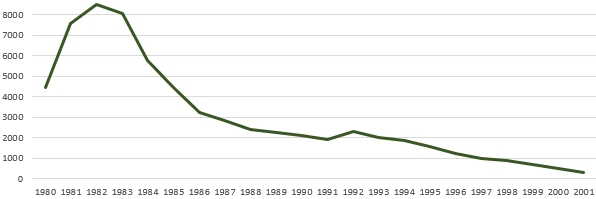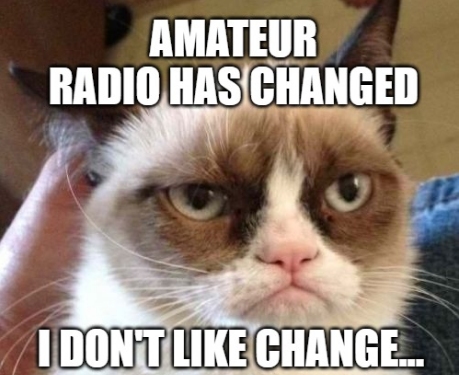As with most hobbies, there’s always someone out there who gains joy from putting others down, or who feels that it’s acceptable to be abusive to others. Sadly, there are a half-dozen individuals out there who routinely trawl through social media, forums and websites looking to insult and upset. Changes are you’ll see their names pop up from time-to-time trying to cause mischief. The good news though is that they make up 0.01% of the UK community – the other 99.9% are generally a friendly and welcoming bunch, and with luck, you’ll make many great friends as you progress through the hobby.
It’s likely that the behaviour of one of the 0.01% you’ve seen online has led you to this page. The word for such behaviour is “trolling“. Do any of these seem familiar (source)?
Trolling Traits:
- Blindness to evidence: Ignoring facts and either doubling down on their stance or redirecting to a new topic altogether.
- Name-calling: Internet trolls aren’t known for their creativity.
- Condescending tone: Trolls love to stoke the fire and then act dismissive when people become angry
- Obliviousness: They seem oblivious to the fact that most people are in disagreement with them
- Topic redirects: This is an old-school trolling technique. Trolls enjoy making off-topic remarks to try and distract from the discussion.
- Overexaggerating: There’s no middle ground for trolls. Everything has to be on the extreme end of the spectrum.
Just as with on-air abuse, the online advice is the same – ignore them. If they’re looking for an argument, don’t give them what they want.
Following requests from some of our members asking why these people have just a problem with newcomers, we’ve put together this page to explore some of the common points used by ham-trolls.
“The exams have been dumbed down”
In fact, it’s the opposite – the exams have got harder. Syllabus updates (notably the 2019 update) have increased the technical and theoretical content at both Foundation and Intermediate (source). Over the last 20 years, the syllabus has expanded to cover more topics.
Those who complain of dumbing down” tend to have passed under the old RAE system. It’s well documented that the old RAE exam is broadly equivalent to today’s Intermediate exam (source), meaning that those who pass “Full” today are required to take a far harder series of exams to get the same licence.
“Foundation is a Fools Licence”
At the turn of the century, numbers joining the hobby were at an all-time low. So much so that City and Guilds gave up running exams due to the lack of demand. This decline, plus the end of exams, would have meant just one thing – no more amateurs.

A decision was made to introduce Foundation, Intermediate and Advanced/Full, to solve these two problems. This was not universally popular at the time, and there are a handful of amateurs who continue to be unhappy about the vote not going their way two decades ago.
The 29,500 people who got a licence since 2002 all had to go through Foundation. The idea that anyone who joined the hobby since 2001 is “an idiot” is plainly ridiculous, and most sane people will simply dismiss this as nonsense.
“Standards have dropped since Foundation”
Again, when you drill into it, this doesn’t stack up. Those who’ve passed an exam recently are more likely to be familiar with the current rules and regulations than those who passed 50 years ago. Also, between 2002 and 2020, all newcomers were required to complete on-air practical assessments (something not done under RAE). It could be argued therefore that the new generation are better trained and prepared.
As to the idea that those who passed before 2002 are all saints, and those passing after 2002 aren’t (as some ham-trolls claim): the website “Laughing Policeman” includes information on court cases of amateurs found guilty of sending offensive / indecent / obscene / menacing messages (source), repeater jamming, swearing, racism and intimidation. Listening on-air, it’s fair to say that not everyone is a perfect operator, and that applies to all age groups, licence levels and age of licence.
That said, we’d certainly support the idea of changing the exam syllabus weighting more towards “operating” and away from electronics theory – more people “operate” than build/design transmitters, so we’d support that change of focus.
“It was better back in the day”
Quite possibly, but amateur radio has changed quite a lot in the last 100 years. It’s no longer a formal qualification or a career path – as defined by Ofcom, it’s a “leisure activity”. People no longer design and build their own transmitters and today’s touch-screen SDR-based transceiver is very different from the sets that amateurs were building in the 60s and 70s. As technology and society have changed, so has the hobby.
Regardless, there’s nothing stopping those who believe that it was better back in the day to continue to do what they did back in the day – building and designing transmitters is still something enjoyed by some amateurs – so it’s not clear why these “newcomer negatives” can’t just do their own thing, and let others do their own thing too. “Live and let live”?

Is ham-trolling productive?
Not really. It only serves to put people off the hobby and to give amateur radio a bad name. Constantly attacking other amateurs, being rude and disrespectful of others is hardly in the best traditions of amateur radio friendship. It’s also unlikely to result in any actual changes. So, perhaps the newcomer negatives could be encouraged to try something a little more practical than making spiteful and unpleasant comments about other licenced amateurs. Ideas include:
- Doing something to bring about change – Become an RSGB volunteer
- Helping out at a club to support newcomers and teach the skills that they think today’s newcomers don’t yet have
- Becoming a tutor – teaching people to become better amateurs
- Putting out content to help newcomers – Youtube videos, websites, training material
- Setting up a group to discuss a strategy for change
- Lobbying Ofcom and the RSGB for change
- Clearly outlining what changes they want and how that would benefit the hobby
- Clearly outlining what changes should be brought in to help the hobby to survive, be relevant and grow
- Or even simply just engaging with today’s amateurs with a little courtesy. Everyone was a beginner once!
Handy links
Comments time
Hopefully, that’s been a useful summary. Below is the comments section of this page – our little corner of the site where we encourage those who enjoy ham-trolling to explain their case without resorting to insults, abuse and attacks. Off-topic or abusive responses will be deleted, in the hope of giving ham-trolls the opportunity to state their case and explain the issues that they have with newcomers to our hobby.


A great well written & insightful page to send those sad ham trolls to.
Essex Ham always a great resource
As always thank you
Well that’s put me off going for a foundation licence I have been thinking of going for it
but not now.
That makes sense. You don’t want to join the 30,000 people who’ve taken up the hobby in the last 20 years, because of 4 people who say nasty things on the Internet. Whatever hobby you end up taking up instead will likely have a few wrong-uns too – it’s not unique to amateur radio, or the Internet.